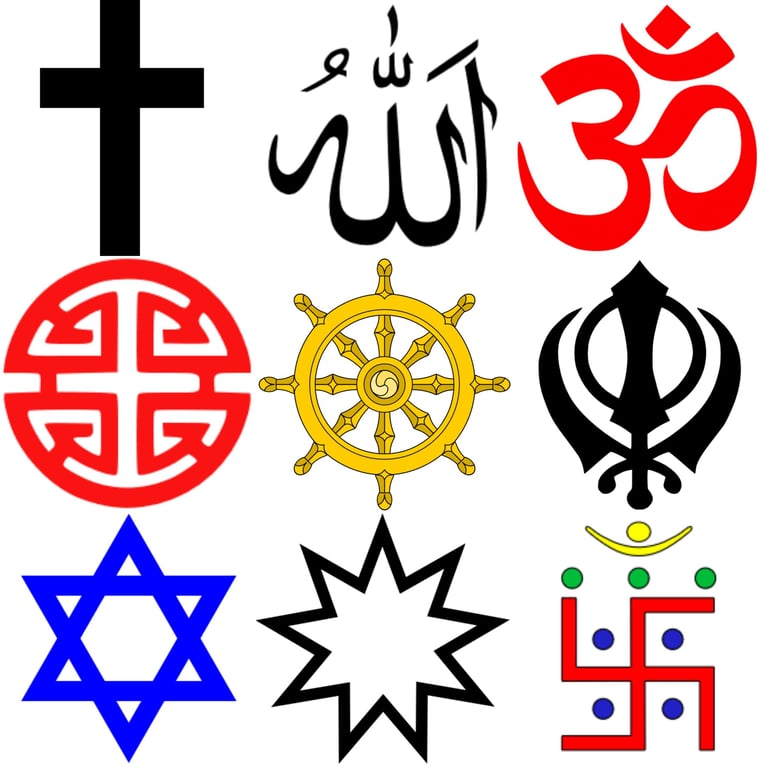Christian FAQs
How do you know Jesus is real?
Why does God need to be worshiped?
Why do we go to Church?
What exactly is faith?
Why are there so many rules in Christianity?
How do we know that God is real?
Where did God come from?
Who is God?
What is God like?
If God is good, why is the world so messed up?
What about the bad stuff Christians have done throughout the ages?
What is Heaven?
What is Hell?
How do you get to Heaven?
What will Heaven be like?
What is the story with the Devil?
Are demons real?
How do you know if you’re saved?
Why does your relationship with God seem one-sided?
Are other religions right, partially right, or wrong?
How do you know that Christianity is the right religion?
If Christianity is right, why are there different sects, denominations, groups, etc.?
What happens to people who don’t believe in Jesus?
What is Sin?
How do we know the Bible is true?
How do you know Jesus is real?


The same way you know any other historical figure is real. You look at the evidence available and you make a judgment call based on the available facts. In the case of Jesus, we have the Bible, the existence of Christianity, Flavius Josephus’ writings, Senator Tacitus’ writings, as well as a few others that all reference or attest to the existence of Jesus. There’s a Wikipedia page on the topic that’s worth the read since it has relevant sources cited in the notes. Evidence That Demands a Verdict by Josh and Sean McDowell also covers the topic.
Why does God need to be worshiped?


He doesn’t. God requires nothing from humankind (Psalm 50:10-12). Instead, the worship is intended for the ones doing the worshiping. A common mistake people make is imagining God as an upgraded human. The thought of worshiping another human is unappealing to most and by extension, the thought of worshiping God also seems unappealing. However, God is not just an upgraded human. He is a completely different type of being.
A good analogy for the situation is that God is to a human what a human is to a painting. The painting is made in the image of the human, but it is not human. It’s not living. It’s not breathing. It has no power. Likewise, humans are made in the image of God, but we lack all of the greatness that makes God, God. We are finite, He is infinite. We are flawed, he is perfect.
Consequently, worshiping God isn’t significantly different from admiring the beauty of a sunset or a sculpture. Proper worship is an act of recognizing the beauty of God. Of recognizing all of the great things he’s done. This recognition has an impact on the one doing the recognizing. This occurs in the same way as one recognizes the beauty of a painting. The benefit of that recognition is acquired by the one doing the recognizing.
Why do we go to Church?


Going to church provides several different things for those who attend. See “Why does God need to be worshiped?”. God doesn’t need you to go to church. You go to church for you. Church provides you, a believer, with a community of other believers. The idea is for you to get to know these other people and to build relationships with them. Together, the members of a church are supposed to help each other through hard times and provide support for one another.
Beyond that, the church provides you with spiritual nourishment. The fact of the matter is that life is hard. We’ll address this later. The church acts as a weekly reminder of what you believe. It helps you orient your life properly and keep things in perspective.
Lastly, the church provides you with an outlet to help your community and the greater world at large. Most churches have outreach programs that involve using church resources to meet needs in the local community. Churches also provide a good deal of support and resources in the form of charity to those in need. The book of Acts, which recounts the early days of the church, illustrates the church serving these functions. So taken all together, these are some of the reasons why you go to church. It’s for your own spiritual benefit.
What exactly is faith?


Faith is an abstract concept that is best explained through analogy. It has a bad reputation in modern society that it really doesn’t deserve. The first dictionary definition of faith is “complete trust or confidence in someone or something.” The second dictionary definition is “strong belief in God or in the doctrines of a religion, based on spiritual apprehension rather than proof.” The very difference between these two definitions shows how society has twisted faith into something it really isn’t. It’s inherently implied that faith is independent of proof but that’s not the actual case.
When you board an aircraft, you have faith in the pilot who flies it, the mechanics who maintain it, the workers who manufacture it, and the engineers who design it. You’ve likely never met any of these people. You don’t know if they had good grades in school. Yet you’re putting your very own life in their hands the moment you board the plane. You assume all of these people are competent, but you don’t really know until the plane touches down at your destination.
Biblical faith is the same. You have reasonable proof that something is what it appears to be. Yet, you have to trust it without fully knowing how everything will turn out. This seems like a hard thing to do, but it’s actually very simple and you do it every day. Every time you board a plane, cross a bridge, enter a building, operate a vehicle, eat food, breathe air, and leave your house, you’re acting on faith. As a matter of fact, you take it on faith that the laws of physics will remain the same from day to day. Can you prove that gravity will always be the same tomorrow as it was today? This is the nature of faith.


Where did God come from?


God by definition has always existed. He is the unmoved mover. This is required logically because if God wasn’t the first god, then something before him would have been. In this case, either there’s a terminal point where there is an always-existing first god, or there’s an infinite regression. The infinite regression approach doesn’t make much sense. See Aquinas’ Five Ways for more details.
However, to summarize, the Bible says, “In the beginning, God created the heavens and the earth,” Gen 1:1 and “In the beginning was the Word, and the Word was with God, and the Word was God,” John 1:1 both of which I’m inclined to believe. God implies that he existed before the beginning which makes sense in accordance with the unmoved mover argument.
Who is God?


God is the pre-existing creator of the universe. He says He is everlasting (Gen 21:33). He says He is merciful, gracious, slow to anger, abounding in steadfast love, faithful, steadfast, and forgiving (Exo 34:6-7). He is not man (Num 23:19). His work is perfect (Deut 32:4). He keeps His promises (1 King 8:56). He searches all hearts and understands all plans (1 Chron 28:9). He is righteous (Psalms 11:7). He is unchanging (Mal 3:6). Essentially, God is the highest ideal from which humans derive all things. One of the main purposes of the Bible is for God to reveal himself to humankind. The pages are filled with him demonstrating His character and how he interacts with the world.
What is God like?


A human describing God is like an ant describing a human. It’s a feat that isn’t possible. God is like a shepherd in the sense that He watches over his flock. He’s like a father in the sense that He cares for His children. He’s like an author in the sense that He crafts stories down to the most minuscule detail. He’s like a raging storm in the sense that he has unlimited power that is beyond human comprehension. He’s like a rock in the sense that He’s a firm foundation. He’s the Alpha and the Omega, the beginning and the end.
Describing what God is like is similar to describing a sunset with words to someone who’s never seen the sun. It’s possible but it falls far short of the true grandeur of seeing an actual sunset. God is like the greatest person you can imagine, a hero of heroes, then multiplied by infinity.
If God is good, why is the world so messed up?


Because mankind messed up. That’s the short answer. The long answer is as follows. The evil in the world breaks down into roughly two categories. Natural evil and man-made evil. Both are the result of mankind screwing things up in the beginning.
As the story goes, in the beginning, God created mankind. He gave man free will and man decided to use that free will to rebel against God. This rebellion was the source of both the natural evil and the man-made evil. You can read the full biblical account of the story in Gen 3.
At any rate, both sources of evil resulted from rebelling against God. Each carries its own unique set of problems.
Natural evil includes the evil that results from the laws of physics. The universe is winding down. Energy can neither be created nor destroyed however it’s needed to fend off the increasing and never-ending march of entropy. From a biological standpoint, living entities need to consume energy. So long as energy consumption is greater than energy expenditure, life will continue. Because of this, it’s advantageous to consume other entities that have already gathered the necessary amount of energy. Just like that, the utility of sacrificing others for self-interest is born.
At a higher level, natural evil includes the death and destruction that come from natural disasters, diseases, degrading bodies on account of aging, and the like. These evils exist independent of human action. Humans don’t cause solar flares or floods. Human action could mitigate some of these evils but against them, humankind is largely powerless.
If he were so inclined, God could eliminate natural evil. It would be possible for him to make a world in which there are no disasters, no illnesses, and no aging. However, I believe the reason he hasn’t is for narrative purposes. The elimination of these issues would result in a lot of meaning being stripped from life in the same way a story with no stakes is boring. If the hero of a novel faces no adversity, then no one cares to read it. There has to be some sort of pressure that’s driving the plot forward. In the case of the universe, the natural evils put time pressure on humankind as a whole and on individuals.
Man-made evil is the much darker of the two evils in the world and it’s the result of human behavior. Man-made evil encompasses murder, rape, theft, lying, war, and the whole gambit of human behaviors that result in humans harming other humans. Unlike natural evil, which God could just solve with a snap of his fingers, man-made evil can’t be solved without modifying man. By nature of having free will, humans have the option to choose to do good or to do evil. Taking away this option would strip humanity of its meaning. If the possibility to choose evil didn’t exist then there would be no merit or value in being good.
So there you have it. Those two evils acting in concert are why the world is so messed up. And even with that said, the world isn’t as messed up as it could be. Likewise, it could be a lot less messed up as well. If mankind were to cease being evil, then the whole of human resourcefulness could be focused on combating the natural evils we face. However, that won’t happen so long as man can choose between good and evil because the temptations to do evil are too great.
What about the bad stuff Christians have done throughout the ages?
Christians have done a lot of bad stuff. So has everyone else. Being a follower of Christ doesn’t make you perfect. It does mean you should be striving to meet the ideal that Christ set forth. All of the bad things Christians have done through the ages are not things that are permitted by Christianity. Throwing out all of Christianity because of some bad Christians is like throwing out all of math because of some wrong math problems. You can’t blame math because people don’t know how to do algebra properly. Likewise, you can’t blame Christianity when individuals or even groups of Christians screw it up.
As for specific offenses, the official Christian mandate is to love the Lord your God with all your heart, soul, and mind and to love your neighbor as yourself. Naturally, following this proclamation would exclude participating in war for conquest, corruption, abuse of others, bearing false witness, and the like. That isn't to say that Christianity is all peace and prosperity. Christianity does include war for defense, a pursuit of the truth, and following God and not man. These things do create conflict. Righteous conflict but conflict nevertheless.
What is Heaven?


The term heaven is used to mean multiple things. This has been a source of continual confusion for everyone involved. In the Bible, the term heaven is used to describe three different things. Its first usage is for describing the sky. Its second usage is for describing outer space, the domain of the stars. Its third use is describing the presence of God, which seems to be a dimension separate from our plane of existence. Paul talks about being caught up to the third Heaven in 2 Cor 12.
The form of heaven we most often concern ourselves with is this third one. Not a ton is known about it. It’s usually described as a paradise that’s beyond imagination (1 Cor 2:9, Rev 21, 22). It seems to contain a city (Heb 11:16, 13:14, Rev 21:1-5). It’s supposed to be uncomprehendingly beautiful. It’s the dwelling place of God. The streets are made from gold and precious gems abound (Rev 21:21-25). There seem to be places for people to live in (John 14:2). Overall, it’s the place you want to be simply because it’s where God dwells. Being in Heaven amounts to being in his presence and since God is the most beautiful thing there is, Heaven is the place you want to be.
What is Hell?


Hell is not the place you want to be. At its simplest, Hell is a place of separation from God. It is a place where He does not dwell. Consequently, it’s devoid of all goodness, happiness, light, and everything else of merit.
The Bible uses some very intense imagery to describe Hell. A lot of it is just that, imagery. Not all of it is intended to be taken literally. For example, Hell is said to have a lake that burns with fire and sulfur (Rev 20:10, 21:8). It is described as eternal punishment (Matt 25:46). It is described as a fiery furnace (Matt 13:50). It is described as the outer darkness (Matt 8:12). It is also described as eternal destruction away from the presence of the Lord and for the glory of his might (2 Thes 1:9).
Fire seems to be the recurring theme. The takeaway is that hell is an unpleasant place. It’s best to avoid it.
How do you get to Heaven?


You get to heaven by believing in Jesus Christ as your Lord and Savior (John 3:16-18). This is a gift from God requiring no work on your part (Eph 2:8-9). If it sounds simple, that’s because it is. At the end of the day, everyone going to heaven is relying on Jesus to do all of the heavy lifting.
What will Heaven be like?


Heaven will be like a paradise. A lot of people think it will be like church, with everyone sitting around signing hymns eternally. This is wrong. Some hymn singing might take place but if that were all that Heaven consisted of, then God wouldn’t have needed to recreate a New Heaven and a New Earth. A large, infinite, white room would have sufficed just fine.
Heaven will be like the most beautiful place you’ve ever been on Earth but all the time. Imagine all the best moments of your life. Now imagine life consisting of nothing but those moments. Good relationships, good food, peace, beauty, happiness, prosperity, light, joy, energy, radiance, and so many more good words all fall short of describing the true grandeur of Heaven in all its glory. See “What is Heaven?” for more details.
What is the story with the Devil?


In the beginning, God created the heavens and the Earth. While creating the heavens, God created angels. Angels are spiritual beings. They’re like humans but without bodies. The angels were created in a hierarchy. At the top of this hierarchy was an angel called Lucifer. Lucifer is who we refer to as the Devil and Satan. Lucifer was so great that he held himself out to be greater than God. He rebelled against God which caused a war to break out in Heaven. A third of the angels rebelled along with Lucifer. They were cast down to Earth. See Revelations 12, Isaiah 14, and Ezekiel 28 for details.
From there, the creation story starts with Lucifer tempting Eve in the Garden of Eden to eat the apple and doom all mankind. After that, Lucifer spends the remainder of history trying to foil God’s ultimate plan for the redemption and salvation of mankind. He shows up in Job, Daniel, during the Gospels, and then again in Revelation.
Lucifer is often viewed as the opposite of God but he is not. God is infinitely more powerful than Lucifer. Instead, Lucifer is more on par with the Arch Angel Michael. God could snap both of them out of existence if he was so inclined. Moreover, Lucifer is powerful but he’s a single entity. He can’t be in two places at one time. He is the Prince of the Earth for the time being but he has no more power or authority than God gives him at any one time. An example of this can be found in the Book of Job where Lucifer has to ask permission from God to torment Job.
His goal appears to be maximizing the amount of chaos he can. He would like to lead the maximum number of people astray that he can before Jesus deals with him at the end of time. He should be taken seriously but for a Christian, he can’t do anything to you without God’s direct permission and he will flee from you upon hearing the name of Jesus.
Are demons real?


Demons are real. A demon is one of the fallen angels that Lucifer took along with him when he was cast out of Heaven. They have the same limitations as Lucifer. They can only be in one place at one time and they have limited power. They can do nothing without the permission of God and they could be snapped out of existence at a moment’s notice.
How do you know if you're saved?


If your salvation was something that you yourself had to do, then it makes sense to ask this question. However, salvation is by grace through faith. It’s not of your own doing and it’s a gift from God. It is not a result of works that you yourself do (Eph 2:8-10). If you believe that Jesus died for your sins and rose from the dead, then that’s all there is to it. Jesus is the one doing all of the work in the equation.
That said, if you are saved, typically you’ll see a few other signs of your salvation. For starters, you’ll generally produce good works in your life. Jesus said that you’ll know a tree by its fruit (Matt 7:15-20). He was specifically speaking of false prophets but this is also true of believers as well. If you’re a Christian but you’re not living the life of a Christian, you may still be saved but you’d have good reason to question your salvation. Moving beyond good works, you’ll generally have a different relationship with sin. Things that you know are wrong will tend to bother you a lot more than they did before your salvation (Rom 8:22-27). You will no longer be comfortable casually sinning. Lastly, sometimes but not always, you’ll see a change in yourself. It depends on how bad things were before you got saved. If you were down in the dumps, homeless, broken-hearted, and all of that, you’ll generally notice a pretty big change in your life when you get saved. However, if you always grew up in the church, your salvation can be much more subtle. There will certainly be a change still but it might happen over such a long time that you just don’t notice it. Salvation means the most to those forgiven the most, but it is still a gift greater than we can comprehend for us all (Luke 5:31-32 and Luke 7:47).
As a final remark, salvation occurs upon justification which happens as soon as you accept Jesus as your savior. Justification is when your sins are blotted out by the sacrifice Jesus made. However, the process of you being transformed to be more like Jesus is known as sanctification and it takes the remainder of your life on Earth to complete. The more sanctified you are, the less you sin. Yet, the amount of sinning you do has little to do with your salvation which occurred at justification. Two people who sin different amounts can both be saved. They’re just at different parts of the process.


Why does your relationship with God seem one-sided?


Mostly because your relationship with God is most similar to your relationship with your father when you were about three years old. At that point, you’re not bringing a whole lot to the table. You spend most of your time crying, complaining, and causing problems. Just like with other people in your life, you need to work on your relationship with God if you want it to be healthy. If you’re not investing any time in your relationship then it’s going to feel very one-sided. Here is a link to a YouTube video that does a good job of explaining how to improve the situation.
Overall, if you want a vibrant and thriving relationship with God you need to do a few things. One, you need to pray regularly. The video covers that. Two, you need to read the Bible. The Bible will help you understand and get to know God. It’s kind of like reading a friend’s biography. Three, you need to spend time with other Christians. This can either be through church or a small group or a bible study. Four, you need to live your life in a manner consistent with God’s word.
If you do all of these things and you are sincere about it, you’ll see an improvement in your relationship with God.
Are other religions right, partially right, or wrong ?


Some are much more right than others. The truths of God are built into the very fabric of creation (Psalm 19:1, Rom 1:18-23). Naturally, other religions are going to stumble across these truths. If you were to look at a religious family tree, you’d quickly see the degree of overlap between the different religions.
An example of something that most religions get right is the moral law. There’s broad agreement that murder, stealing, lying, rape, and adultery are wrong across most religions. So in that sense, a large amount of people get that much right. Branching out from there results in less and less agreement.
If Christianity is assumed to be right (see “How do you know that Christianity is the right religion?”), then Judaism and Islam are closer to being right than Hinduism and Buddhism.
How do you know that Christianity is the right religion?
Through its track record, its proclamations about itself, and its philosophies. Christianity has a track record of doing an unparalleled amount of good in the world. Ever since it was founded, Christians have constantly been making a positive impact on the world. They’ve gone out of their way to help the downtrodden and the oppressed masses. We have Christianity to thank for science, most of literature, most institutions, and much of the good that’s been done in the world.
You might counter with the Crusades, the Inquisitions, witch burnings, corruption, and abuse of power. This is an invalid critique for two reasons. First, show me a religion and I’ll show you a pile of dead bodies. Before you counter and say that all religion is bad and that atheists are good, no one in the history of humanity has piled up as many dead bodies as atheists. The USSR, Fascist Germany, and early Communist China were all atheist states. The deaths Christianity is accused of are far outweighed by the lives that it has saved. Second, all of the bad things that Christianity is accused of were carried out by people acting against the cornerstone doctrines of Christianity. The Bible is very clear about the expectations for Christians. Christianity is a religion of sacrifice. There is no place in it for corruption, murder, abuse of power, and all of that other garbage.
Of the offenses leveled at Christianity, the Crusades are the only transgressions I would dare to even defend. All of the rest are cases of sinful men acting against the will of God and defying the mandates laid out in the Bible. Blaming Christianity as a whole because a few popes sucked is like meeting someone from New York City who was an asshole and then assuming the whole city is filled with assholes.
So those mud spots aside, the track record of Christianity is sound. It has been the single greatest force for good in the world. Period. Next, you know Christianity is the right religion because it tells you as much about itself. Jesus is very clear about the exclusivity of Christianity. The Bible as a whole is very clear about other gods as well. Here are some quotes to that effect in no particular order: John 14:6, Acts 4:12, 1 Tim 2:5, John 10:9, John 3:36, Isaiah 44:6, 1 Cor 8:6, and the list could go on. So Christianity is very clear about its exclusivity. It recognizes no other religions as being valid.
Last but certainly not least, you have the philosophies of Christianity. The Christian worldview is based on a few key ideas. First, the universe was designed and created by a supreme being. Second, humans were created in the image of God. Third, God cares about humans. From these three flow the wealth and riches of Christianity.
The universe being designed and created by a supreme being is the foundation for science. If the universe was designed by the ultimate intelligence, then it follows that there is a purpose in creation and that it is possible to determine this purpose through investigation. Math, Biology, Physics, Chemistry, and the whole gambit attest to this. The universe behaves in a very specific way and has predictable outcomes. There is an underlying logic to it and it can be understood. Through this understanding, the creator of the universe can be better understood. This is why science developed under Christianity and not one of the other religions.
Humans being created in the image of God is the foundation for the value of human life. To destroy a human is to destroy a creation of the highest being in existence. It is also an act of destroying something of immense beauty. Each human carries within a spark of the divine. Killing a human snuffs out that spark of divinity, forever robbing the world of the glory that may have resulted had the person lived a full life. So from this, moral law is derived.
That God cares about humans is the foundation for meaning in the life of a human. Each individual is a treasured creation of God and treasured by God. This is independent of the opinions of other humans. This is the source of freedom, liberation, and purpose for all mankind.
From these three acting together, all of the other pillars of the Christian worldview flow forth weaving together a tapestry depicting a reality that’s worth existing in. None of the other religions offer this. Judaism comes the closest.


If Christianity is right, why are there different sects, denominations, groups, etc.?


Mostly because Christians are flawed people and prone to screwing stuff up. The different sects of Christianity are the results of disagreements over the 2,000 years of church history that have unfolded. All Christians agree about the core tenets of Christianity. It’s a few of the finer and less significant details that have caused the divisions. These disagreements revolve around the interpretation of the Bible and traditions.
What happens to people who don’t believe in Jesus?


It’s unclear. This is on account of there being a few categories that people can fall into. The people who have heard the message about Jesus and rejected it have rejected God. Consequently, if they die, they will face eternal separation from God. They will not be in Heaven, in the presence of God. This will be on account of their choosing.
For people who never reached the age of accountability, in other words, babies, really small children, and the mentally handicapped, these people will go to Heaven. Jesus died for their original sin and they were incapable of sinning on their own accord.
For the people who went their whole lives without ever hearing the message about Jesus, it’s difficult to say. The 12th chapter of Luke talks about this situation a bit toward the end of the chapter. To paraphrase Jesus, the one who does something wrong unknowingly will receive a lesser punishment than the one who does something wrong knowingly. So, I suspect that any individuals who died without hearing about Jesus will probably be given an opportunity to either accept him or reject him. Their decision at that moment will then determine their fate.
What is Sin?


Sin is missing the mark. It’s actually derived from an archery term that meant “to miss the mark”. God sets the unattainable ideal that humans are to strive for in our actions. Any time we fail to meet this ideal is an occurrence of sin.
The first occurrence of sin was when Eve took a bite out of the forbidden fruit. This was an act of disobedience to God. In other words, if God were in Eve’s shoes, he would not have taken a bite of the apple. Since God is the perfect ideal of Justice, Truth, Righteousness, Goodness, and all of that, he cannot tolerate sin. Consequently, the wages of sin is death (Rom 6:23).
Committing a single sin is enough to merit death. The first sin that Eve committed is known as the original sin because it was passed down through her and Adam to all of humanity.
Subsequently, as history advanced forward, each human born had the wages of the original sin on their head along with the wages of their own personal sins. It took Jesus living a perfect sin-free life to pay back the penalty of the original sin. Since he did that, everyone who believes in him and his sacrifice can have his payment cover their personal sin as well. This is what allows them to enter into the presence of God because their sins have been paid for and Justice has been served.
How do we know the Bible is true?


There are several ways the truth of the Bible can be attested to. For events that occurred in the Mid-Old Testament to the New Testament, we can review historical evidence that supports the validity of the Bible. The book Evidence That Demands a Verdict by Josh and Sean McDowell is a good resource on this topic. The accuracy of the written text of the Bible is attested to by the sheer volume of ancient manuscripts we have of the Bible. More copies of the Bible have survived the test of time than any other ancient literary work. Consequently, we’re fairly confident of the reliable transmission of the text throughout the ages. When looking at the miracles and the front half of the Old Testament, less historical evidence is available in support. In the same way, you can’t prove you had a ham sandwich on 9/15/2015 for lunch, you can’t prove that Jesus fed the 5,000 on a Tuesday in 29-ish CE. All you have is a historical record in support of the event taking place. The Bible in the case of the feeding of 5,000 and maybe a receipt in the case of your ham sandwich.
For the parts of the Bible that pertain more to the reality of the world, you can test it for yourself to determine if it’s true or not. For example, Proverbs 9:8 says, “Don’t rebuke a mocker, or he will hate you; rebuke the wise, and he will love you.” This is something you can test out in your own life to see if it’s true or not.
For other parts of the Bible, such as the creation story, exact proof is difficult. In these cases, it may make more sense to look for the underlying structure and use that instead. Beyond that, it helps to understand that the Bible is a library of 66 books containing multiple genres of literature. You don’t interpret poetry the same way you interpret the morning news. The same rules apply to the Bible.










